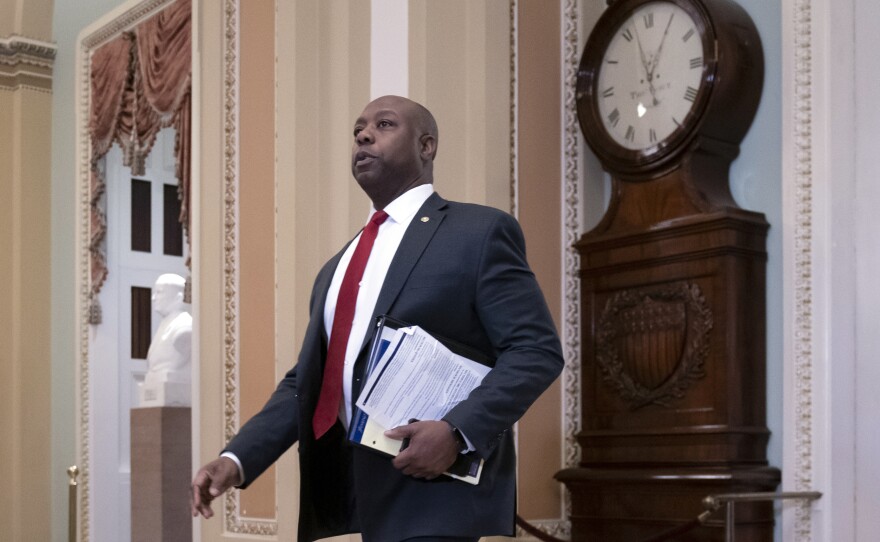Senate Majority Leader Mitch McConnell tapped Sen. Tim Scott of South Carolina, the chamber's lone black Republican, to put together a legislative package addressing the country's policing system.
The plan would respond to the "obvious racial discrimination that we've seen on full display on our television screens over the last two weeks," McConnell told reporters following a GOP luncheon Tuesday to discuss the issue.
The plan comes a day after Democrats – with the support of more than 200 co-sponsors – rolled out their plan to overhaul law enforcement departments across the country. Scott told reporters he hopes Republicans can get a bill on the Senate floor before their July Fourth break.
Scott said Republicans are considering a proposal to increase training to focus on de-escalation tactics that would lessen the potential for chokeholds and other dangerous forms of police restraints. But Scott was clear his GOP colleagues aren't fans of the major items in the Democratic legislation, which includes bans on chokeholds and no-knock warrants in drug-related cases. He also ruled out reform of the legal doctrine for police known as qualified immunity — a key provision in the bill Democrats unveiled Monday.
The South Carolina Republican said there's also talk about bringing more police departments under reporting requirements to the FBI and Justice Department. Today, only 40% are under such reporting requirements, and that needs to change, Scott said.
"We'd like to see all the agencies report, so we're going to provide either resources for it or perhaps reduce grants if they don't," Scott said.
The GOP is also discussing setting up a commission to get a handle on concerns facing policing today, Scott added.
The plan would trigger "the establishment of a 'National Police Commission' study, so that we can figure out best practices that can used across all departments that we would at least direct funding and resources toward in that direction," he said.
Scott also noted it's time to increase funding for police body cameras, which stands at less than $20 million today.
"I'd like to see that number grow significantly," he said.
Scott said he'll be developing the legislation as part of a working group that includes Republican Sens. Lindsey Graham of South Carolina, Ben Sasse of Nebraska, James Lankford of Oklahoma, John Cornyn of Texas and Shelley Moore Capito of West Virginia.
Scott said he's in talks with the White House and he's hopeful the plan could win President Trump's support.
"We are on a separate track from the White House," Scott said. "I have been talking with folks in the White House about the track that they're on as well. I think there is some synergy between all three tracks."
Later Tuesday, Scott received a visit from White House Chief of Staff Mark Meadows, White House adviser and Trump son-in-law Jared Kushner and Ja'Ron Smith, deputy director of the White House Office of American Innovation.
"We're making progress," Scott said.
Meadows later told some Capitol Hill reporters that the group had a "real good conversation" and is hopeful for a plan sooner rather than later.
"We're hopeful that we can address the issue in a real way," Meadows said but declined to say whether the White House could be supportive of Scott's plan so far. "It's a work in progress."
Scott said Republicans would also be working the phones Tuesday to see if any Democrats would join in the legislative effort. However, he was clear that Republicans aren't on board with the Democratic proposal and wouldn't be moving forward with it.
"I basically shy away from telling local law enforcement: You shouldn't do that or you can't do this," Scott said, referring to bans on no-knock warrants in drug-related cases and chokeholds. "I think their bill has a tendency to be seen as perhaps a nationalization of some of the underlying issues or techniques."
Sen. Rand Paul, R-Ky., said competing party-driven plans could make it difficult for Congress to approve a reform bill.
"I think there's going to be a Republican proposal and a Democrat proposal. The only thing that bothers me about that, is what usually happens when there's a Republican proposal and a Democrat proposal?" Paul asked. "An impasse and nothing."
But McConnell said he remained hopeful of a plan moving forward. He noted 50 years after major civil rights legislation "we are still wrestling with America's original's sin," adding, "It's perfectly clear we are a long way from the finish line."
The majority leader said it was important "to listen to one of our own" – Scott – who, McConnell noted, has personal experiences with racial discrimination that have continued since he began his Senate career.
Separately, Sen. Tom Cotton, R-Ark., introduced a resolution that called for justice for Floyd but also expressed opposition to calls from some advocates to "defund the police." Cotton's office indicated he would ask for unanimous consent to approve the resolution on Wednesday. Scott was not listed as a co-sponsor.
Copyright 2020 NPR. To see more, visit https://www.npr.org.






